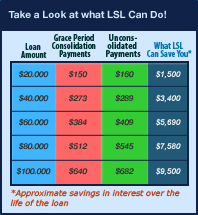 |
Since the passage of the Federal Deficit Reduction Act earlier this year, lawmakers, administrators, and students have been in a state of consternation over the future of federal student aid.
The budget-cutting act eliminated financial aid programs and raised interest on federally guaranteed student loans by more than two percentage points.
The boldly titled Reverse the Raid on Student Aid Act of 2006 (RRSA) proposes slashing student loan interest rates in half. The act also makes provisions for students who want to consolidate loans while still enrolled in school and raises the maximum Pell Grant amount by $2,000 over the next five years.
Law School Loans CEO, A. Harrison Barnes, applauds the effort to restore funds to grant programs and reduce exorbitant interest on federal student loans.
"One report estimated that around 200,000 Americans chose to not pursue a college education because of the cost. That’s a shame; it’s a shame to the federal government and to the lending industry."
Barnes continued, "At the end of the day," he said, "we’re all trying to help the greatest possible number of American students to go to college and finish a degree. If this bill gives more students more money to obtain an education—both by boosting grants and lowering interest rates—then our company stands firmly behind it."
Introduced in the Senate by Sen. Dick Durbin (D-IL) as S.2573, the bill was simultaneously introduced in the House as H.R.5150 by Rep. George Miller (D-CA). Both bills have been in committee since early April.
"To keep America’s edge, we need to recognize the value of investing in higher education and providing the assistance needed for our students to compete in the global economy,” said Durbin in a press release. “We need to get our priorities right. The best investment we can make in our nation is in our students and in access to education."
Miller also issued a statement decrying the Bush-supported budget cuts, stating, “President Bush ran for office as a self-proclaimed education president, but he is undermining efforts to ensure that students get what they need to advance their educations.”
He continued, "This is one more way that the President passes the burden of his record deficits, created by tax cuts for the rich and a weak economy, onto students trying their hardest to do the right thing and build a better life for themselves."
For loans issued through the Federal Family Education Loan Program (FFELP) and Direct loans, interest rates are set to rise to 6.8 percent on July 1. The RRSA Act cuts that rate to 3.4 percent. On PLUS loans, rates were to be set at 8.5 percent; again, the interest rate was reduced to 4.25 percent.
Student loans are a main focus of the proposed legislation; however, they are not the only programs the bill addresses.
Pell Grant amounts have been frozen at $4,050 since 2001, despite President Bush’s second-term campaign promise to raise the amount to $5,100. At most institutions, tuition has risen significantly over the past five years. Reports show that between 2001 and 2006, most colleges and universities experienced a 44-percent increase in tuition and fees. When inflation is considered, Pell grants are actually worth $500 less than they were 30 years ago.
The RRSA Act proposes that the grant amount be increased to $4,500 for the 2007-2008 academic year. It would increase the grant amount through academic year, when the grant would be worth $6,000 per year per eligible student.
Another provision of the bill allows for the reinstating of in-school consolidation, which allows student borrowers to consolidate their education loans while they are enrolled in school.
According to the House Committee on Education and the Workforce, this bill could save the average student borrower $5,600.
Durbin noted in a press conference that he hopes to see a vote on this bill before the July 1 deadline for interest rate increases; however, Senate sources confirmed that the RRSA Act will not be discussed on the floor until after Congress’ May 29-June 5 recess.
Durbin and Miller are both calling for support from students and their families. Borrowers are urged to contact their senators and representatives and implore them to support the RRSA Act.
Representatives and senators can be reached by calling the Capitol switchboard at 202.224.3121 or by logging onto the legislative bodies’ respective websites, www.house.gov and www.senate.gov.
|
|
 |














 You may choose to change your repayment plan after your loan has been consolidated. There is also no prepayment penalty, so you may pay more than your scheduled payment at any time.
You may choose to change your repayment plan after your loan has been consolidated. There is also no prepayment penalty, so you may pay more than your scheduled payment at any time.
